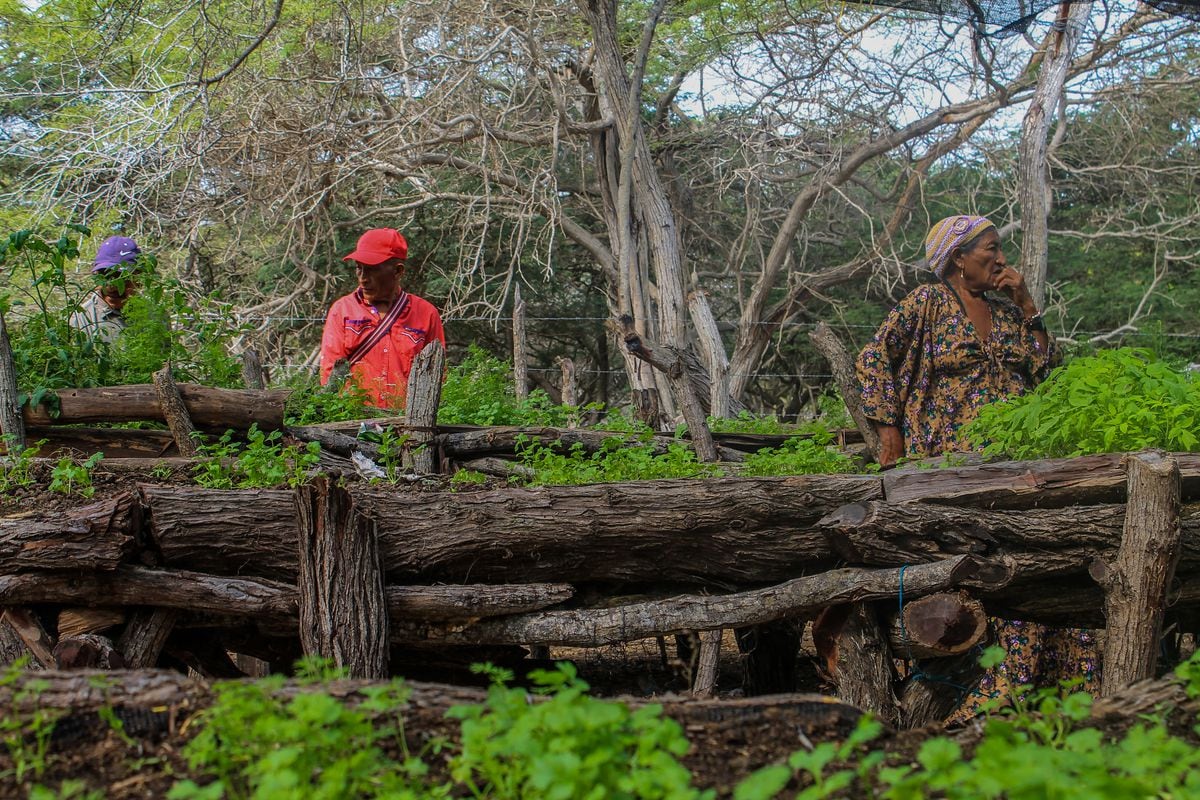EL PAÍS offers the América Futura section open for its daily and global informative contribution on sustainable development.
If you want to support our journalism, subscribe
here
.
María Concepción Gómez bends over an orchard of almost one hectare and picks up one of its fruits.
"Here we eat tasty," says the woman of the Wayuu ethnic group.
With here she refers to her community, Apairao, located in Nazareth, a town in the Colombian Alta Guajira, next to the Macuira National Natural Park and almost eight hours of desert from Riohacha, the capital.
In her department, La Guajira, the poverty rate is greater than 50%, according to the national statistics department, DANE.
In its territory, one of the most arid areas of the country, it is common to hear about the "water problem" and frequent news about malnutrition in childhood also comes from there.
But what you see around you could be the antithesis of what is said about La Guajira.
The place where she is standing is a community garden, with dozens of fruit trees and plants, where nine Wayuu families work.
There, the water stopped being a problem.
It comes from an underground well, pumped by a motor powered by a solar panel, and is distributed through drip irrigation for several minutes a day throughout the orchard.
What is produced is varied.
There is sideburn, plantain, arracacha, coriander, cherry tomato and chili, among many others.
"Things we didn't eat before," says Gómez.
A member of the community of Santa Rosa plants a tomato, one of the fruits that they did not eat before.María Mónica Monsalve
Their garden has become a laboratory for the community.
"The tomatoes did not grow in the sun and now they do better in the shade," says another woman, referring to a recommendation they received from a technical team from the Alpina Foundation about leaving the trees inside the orchard, and not cutting them down to clear the territory.
This is how they avoid deforestation.
The community has been experimenting by trial and error for a year.
"The idea of this project is to strengthen local agri-food systems," explains Elver García Rodríguez, technical coordinator of the Alpina Foundation, an organization that, for a year now, has supported seven other communities around Nazareth, in addition to Apairao. , so that they create these closed systems, where it is also key that nothing is wasted.
In these orchards, pests are attacked with a mixture of spicy and tobacco leaves.
And a few months ago Californian worms arrived to help their guardians turn waste into compost.
“At first we were afraid to put our hand in it, but you get used to it,” says Helena Urinia, a Wayuu from the Santa Rosa community, as she carelessly puts her hand into the ground looking for worms.
According to his account, his job at wakes is to bring "chili, paprika and coriander."
But in this orchard, the one in Santa Rosa, which is cared for by six people, there is also space to grow grass for the donkeys and goats.
“Animals matter too,” he says.
What families do not eat is sold to neighbors or exchanged for another vegetable at an equivalent of what is on the market.
As of March, they also began to sell it at a point of sale that the eight participating communities opened in the town center in Nazareth.
Helena Urinia, a Wayuu woman, points out her cilantro crops in the community of Santa RosaMaría Mónica Monsalve
"Part of the project involves creating self-managed associative savings and credit models," says García Rodríguez.
What helps them, first, to be able to request calls from the Colombian State that sets the condition that the figure of association exists.
And, second, so that they can be sustainable in the long term.
In Apairao, for example, the savings and credit group saves a small part of its income to maintain the underground water well.
In addition, the eight communities created the Kottirawa'a Wapushuaya association, the owner of the recently opened point of sale.
According to data from the Alpina Foundation, which has been monitoring the process, these systems have saved the eight communities around nine million pesos in seven months (almost $2,000) and increased the profit margin per production cycle by 68 %, benefiting 172 families.
“In an area like Alta Guajira, stigmatized by malnutrition and hunger, the key issue is timely access to nutritious and safe food,” says García.
Therefore, after a year of experience, the Foundation will start to support three more communities, this time within the Macuira National Natural Park.
In addition, over the next few months, they will deliver 80 bicycles, together with World Bicycle Relief, so that they can get their products from the rancherías to the market more easily.
Without having to walk for two hours.
The Wayuu communities have begun to grow new products like this chili pepper, which they often take to wakes.María Mónica Monsalve
From what comes from the orchards, the sheds and the grazing, lunch comes out.
Meat, goat, rice, carrot and beetroot.
As Gómez says, a tasty lunch.
*The Alpina Foundation financed the trip to learn about the project.

